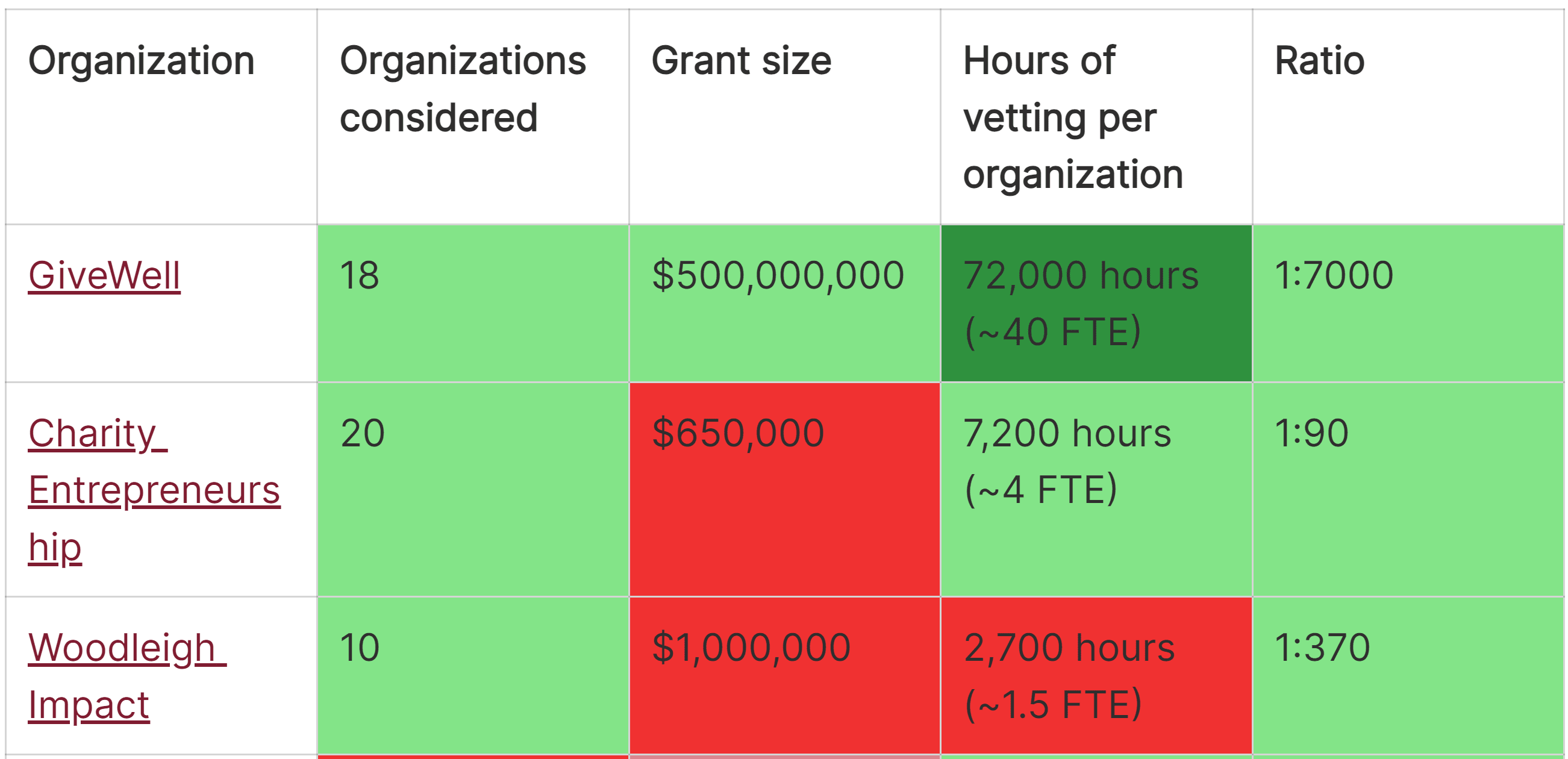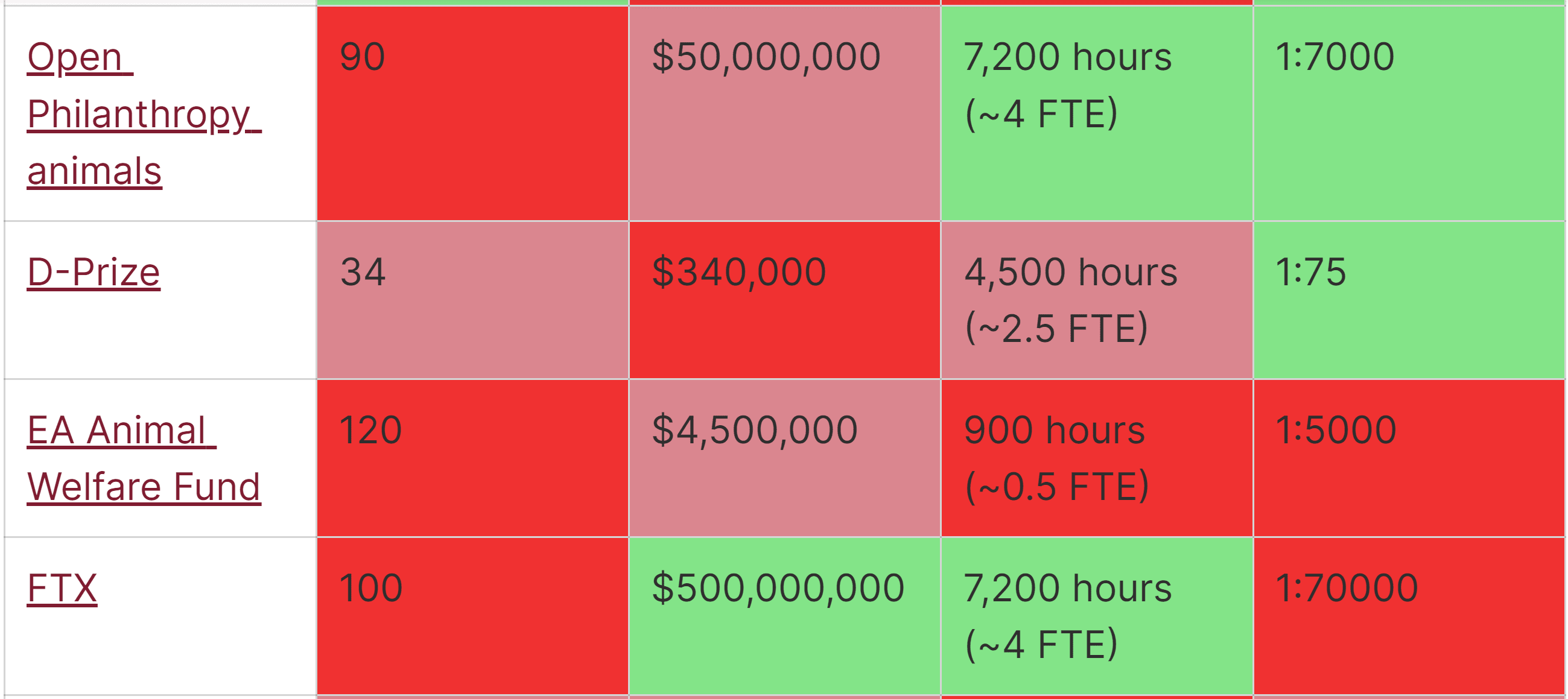On 17 February 2024, the mean length of the main text of the write-ups of Open Philanthropy’s largest grants in each of its 30 focus areas was only 2.50 paragraphs, whereas the mean amount was 14.2 M 2022-$[1]. For 23 of the 30 largest grants, it was just 1 paragraph. The calculations and information about the grants is in this Sheet.
Should the main text of the write-ups of Open Philanthropy’s large grants (e.g. at least 1 M$) be longer than 1 paragraph? I think greater reasoning transparency would be good, so I would like it if Open Philanthropy had longer write-ups.
In terms of other grantmakers aligned with effective altruism[2]:
- Charity Entrepreneurship (CE) produces an in-depth report for each organisation it incubates (see CE’s research).
- Effective Altruism Funds has write-ups of 1 sentence for the vast majority of the grants of its 4 funds.
- Founders Pledge has write-ups of 1 sentence for the vast majority of the grants of its 4 funds.
- Future of Life Institute’s grants have write-ups roughly as long as Open Philanthropy.
- Longview Philanthropy’s grants have write-ups roughly as long as Open Philanthropy.
- Manifund's grants have write-ups (comments) of a few paragraphs.
- Survival and Flourishing Fund has write-ups of a few words for the vast majority of its grants.
I encourage all of the above except for CE to have longer write-ups. I focussed on Open Philanthropy in this post given it accounts for the vast majority of the grants aligned with effective altruism.
Some context:
- Holden Karnofsky posted about how Open Philanthropy was thinking about openness and information sharing in 2016.
- There was a discussion in early 2023 about whether Open Philanthropy should share a ranking of grants it produced then.
- ^
Open Philanthropy has 17 broad focus areas, 9 under global health and wellbeing, 4 under global catastrophic risks (GCRs), and 4 under other areas. However, its grants are associated with 30 areas.
I define main text as that besides headings, and not including paragraphs of the type:
- “Grant investigator: [name]”.
- “This page was reviewed but not written by the grant investigator. [Organisation] staff also reviewed this page prior to publication”.
- “This follows our [dates with links to previous grants to the organisation] support, and falls within our focus area of [area]”.
- “The grant amount was updated in [date(s)]”.
- “See [organisation's] page on this grant for more details”.
- “This grant is part of our Regranting Challenge. See the Regranting Challenge website for more details on this grant”.
- “This is a discretionary grant”.
I count lists of bullets as 1 paragraph.
- ^
The grantmakers are ordered alphabetically.




(Appreciate the upvote!)
At a high level, l I'm of the opinion that we practice better reasoning transparency than ~all EA funding sources outside of global health, e.g. a) I'm responding to your thread here and other people have not, b) (I think) people can have a decent model of what we actually do rather than just an amorphous positive impression, and c) I make an effort of politely delivering messages that most grantmakers are aware of but don't say because they're worried about flack.
It's really not obvious that this is the best use of limited resources compared to e.g. engaging with large donors directly or having very polished outwards-facing content, but I do think criticizing our lack of public output is odd given that we invest more in it than almost anybody else.
(I do wonder if there's an effect where because we communicate our overall views so much, we become a more obvious/noticeable target to criticize.)
Well, I haven't read CE's reports. Have you?
I think you have a procedure-focused view where the important thing is that articles are written, regardless of whether they're read. I mostly don't personally think it's valuable to write things people don't read. (though again for all I know CE's reports are widely read, in which case I'd update!) And it's actually harder to write things people want to read than to just write things.
(To be clear, I think there are exceptions. Eg all else equal, writing up your thoughts/cruxes/BOTECs are good even if nobody else reads them because it helps with improving quality of thinking).
We've started working on this, but no promises. My guess is that making public the rejected applications is more valuable than accepted ones, eg on Manifund. Note that grantees also have the option to upload their applications as well (and there are less privacy concerns if grantees choose to reveal this information).